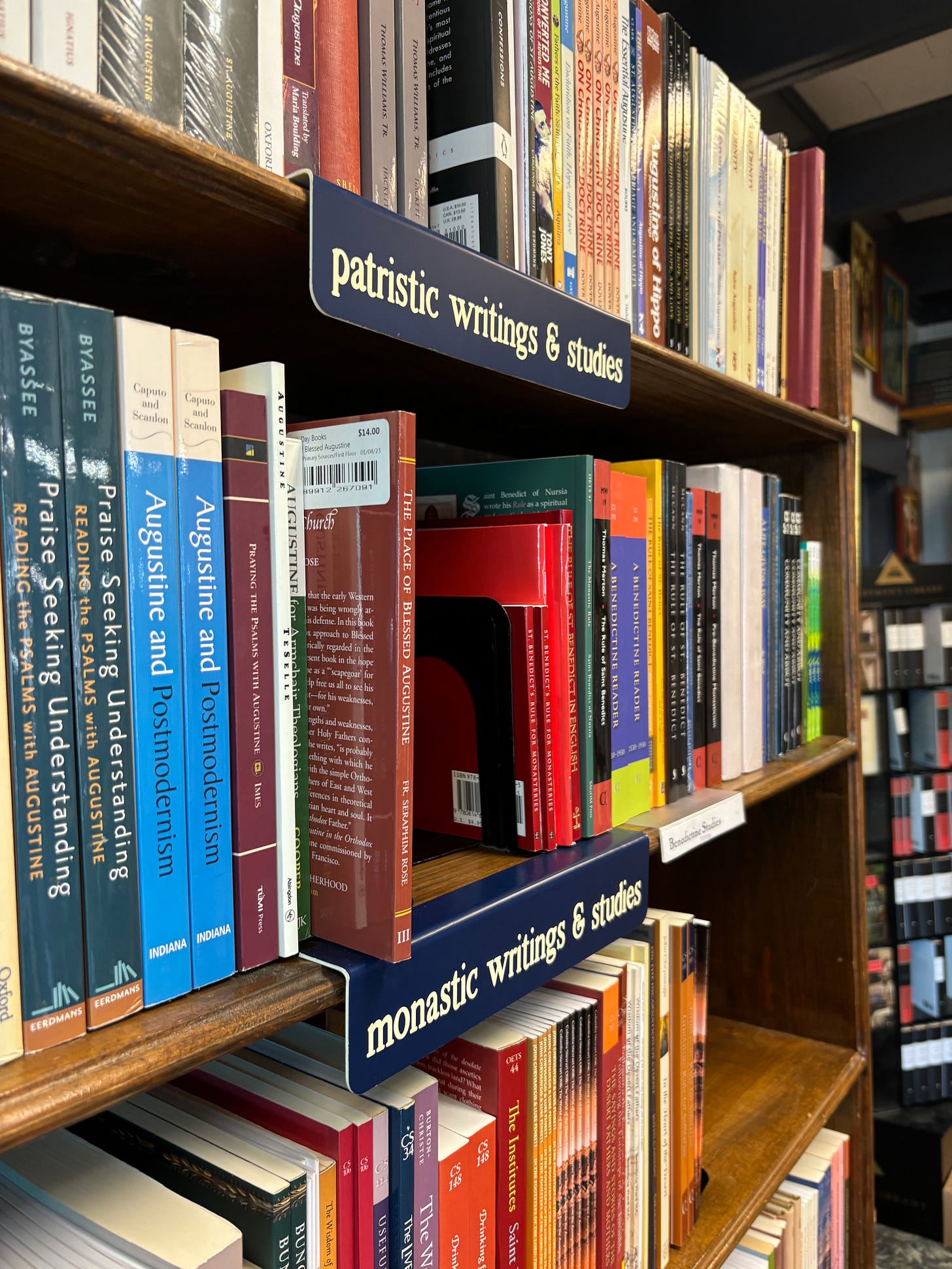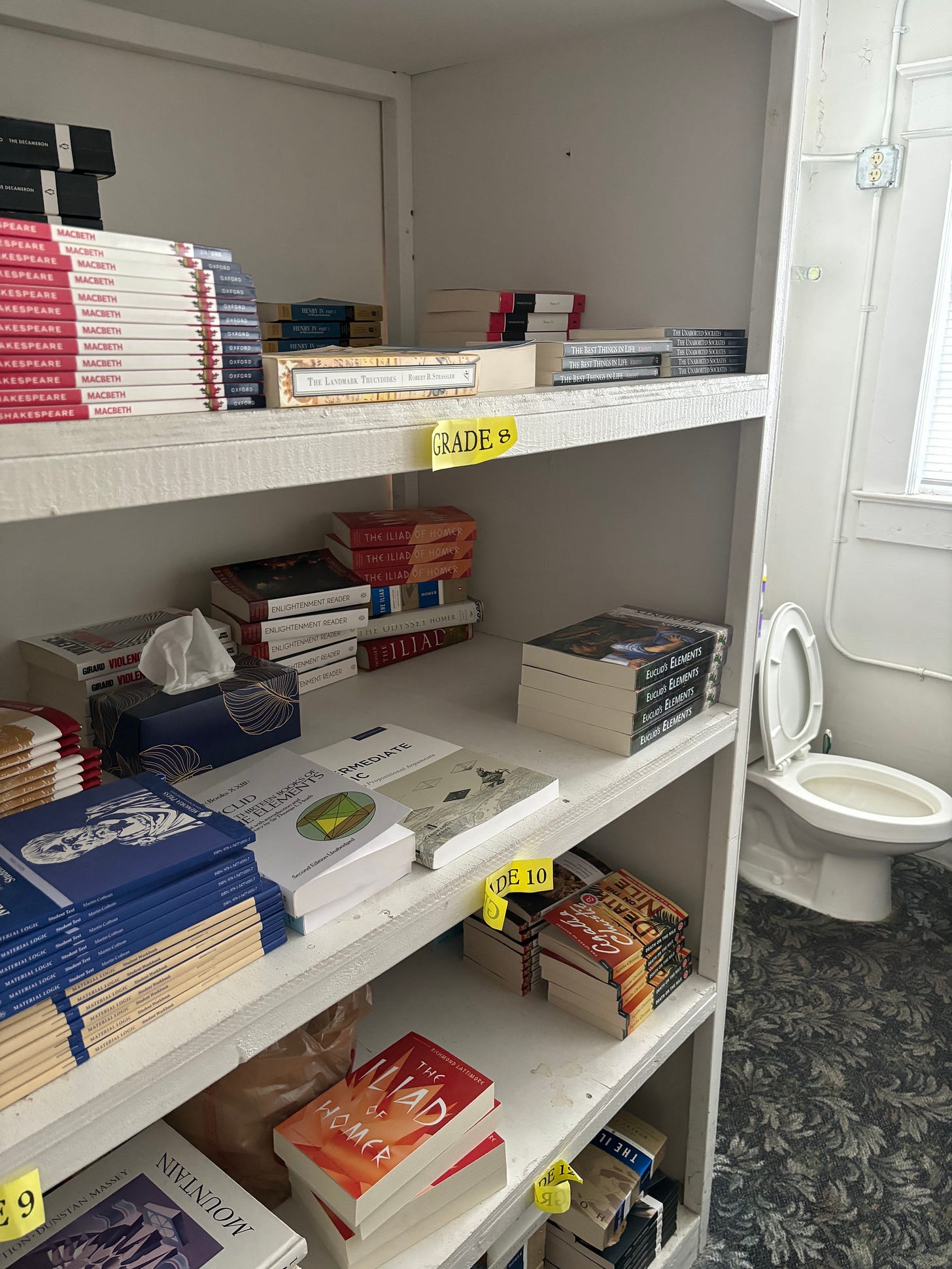Blue Highways Natalism
and the typical bookstore that resonates with st. justin martyr in his second apology
In a famous-in-certain-circles 1999 open letter, the social conservative activist Paul Weyrich — a co-founder of the Heritage Foundation, and the person who told Jerry Falwell to call his organization the “Moral Majority” — warned that politics had failed, and would continue to fail:
In looking at the long history of conservative politics, from the defeat of Robert Taft in 1952, to the nomination of Barry Goldwater, to the takeover of the Republican Party in 1994, I think it is fair to say that conservatives have learned to succeed in politics. That is, we got our people elected.
But that did not result in the adoption of our agenda. The reason, I think, is that politics itself has failed. And politics has failed because of the collapse of the culture. The culture we are living in becomes an ever-wider sewer. In truth, I think we are caught up in a cultural collapse of historic proportions, a collapse so great that it simply overwhelms politics.
And so, he concluded, “we probably have lost the culture war.” With that diagnosis, he suggested the medicine of withdrawal and separation: “We need some sort of quarantine.”
My hunch — and it’s just a hunch, not something I can prove — is that a sizable and largely hidden counterculture has found its way to Weyrich’s conclusion even without knowing about his advice. Traveling through rural and small-town settings, this week, I keep seeing families: Four or five children moving in a gaggle with mom and dad. I live in a place where a second child is regarded as a brave decision, so it gets my attention.
In a tiny mountain town, I bought a cup of coffee from a young woman who was wearing a baby on a sling and dragging a toddler around as a hitchhiker on her left leg. The coffee counter was in front of a curtain, behind which was a family kitchen and a home. They lived behind their business, distinctly separate in a place off a back highway that would be difficult to stumble into. I’ve seen several versions of this, a few times in country stores at the side of gravel roads. I’ve been looking at young adults who are separate, and building families.
Related, it’s striking to see this family pattern over and over again in isolated independent businesses, which again reflects the theme of withdrawal. The counterculture isn’t arguing; it’s hunkering down. I’ve tried to find data on this question, and it doesn’t go very far down: rural vs. urban birth rates. Rural birth rates are higher, which public health authorities regard as a sign of crisis — they need more contraception. But I don’t think the cultural withdrawal I’m guessing at is simply a question of rural places; rather, I suspect there’s a very specific and deliberate search for clearly out-of-the-way rural places, the back roads behind the back roads. If you’re looking for tradcath natalists, try a numbered county road in the most remote part of a farming region. By the way, after seeing a large Amish presence in Colorado, I’m also seeing Amish communities in Kansas. Speaking of deliberate separation. I had no idea.
There are signs of this family-facing, culturally and religiously conservative, carefully separate counterculture in some bigger places, too, and I just happened across an astonishing bookstore: Eighth Day Books, in Wichita, Kansas. Like Barnes & Noble, they divide sections like this:
With whole sections like this:
A homeschooling curriculum ran out of shelf space and continues into the bathroom:
See their self-description here: They offer “an eccentric community of books based on this organizing principle: if a book (be it literary, scientific, historical, or theological) sheds light on ultimate questions in an excellent way, then it's a worthy candidate for inclusion in our catalog….We also resonate with St. Justin Martyr in his Second Apology (paraphrased a bit): that which is true, is ours.”
Online ordering here, where you can browse by categories: Eastern Christendom, patristics, liturgy, desert tradition….
Eighth Day Books is a project of the Eighth Day Institute, which seeks “the renewal of culture through faith and learning”:
We are a Christian organization who promotes the cultivation of friendships through conversations about how the faith of our fathers can help us navigate the new dark ages. If you long to bring life to the decaying culture in our cities, and if you desire to uncover timeless ways to foster virtue in your soul, we're here for you.
I think they’re very much not alone in that perception of a “new dark ages,” and my impression is that a bunch of extremely alert people are proceeding against the age in a spirit of deliberateness — in places where they’re hard to find.
I wrote a piece for The Federalist a few years ago that described the American diplomat Robert Murphy during a wartime posting in France. He was stunned by the cleverness and wit of the French officials he met — as they governed what was left of their country from Vichy, having withdrawn from conquered Paris.
My impression of the American ruling class is that it has become a gathering of performatively cosmopolitan provincials, descending into ignorance and epistemic closure. Meanwhile, in Wichita, people are reading deeply in the earliest history and theology of their church, looking for the start of the thread, with a sustained depth of thought.
The periphery is becoming much more interesting than the center, which is a pretty clear sign of decadence at the center.
But talk me out of this, if I’m missing something.






One of the biggest influences in my life is when I moved from suburban Boston to teach school in a rural farming community in Ohio. That was over fifty years ago. I had presumed that these farmers were intellectually stilted and largely uneducated. Boy, was I wrong! In retrospect, I realized how stilted Boston was.
I thought about it, and I think the difference is that farmers in a small community know that they must deal with natural reality. They can't pass a law to make it rain. Or not rain. They deal with the reality constantly. They know each other and cooperate with each other.
In Boston, and in other such places, they think they can imagine new realities to suit themselves They are legends in their own minds. They have no idea how much they don't know.
You're not missing anything. To have children is the greatest joy in life and gives you a sense of intentional purpose and leaves a legacy for your grandchildren as a job well done.
Sacrifice for others is an intentional decision with lifelong dividends.